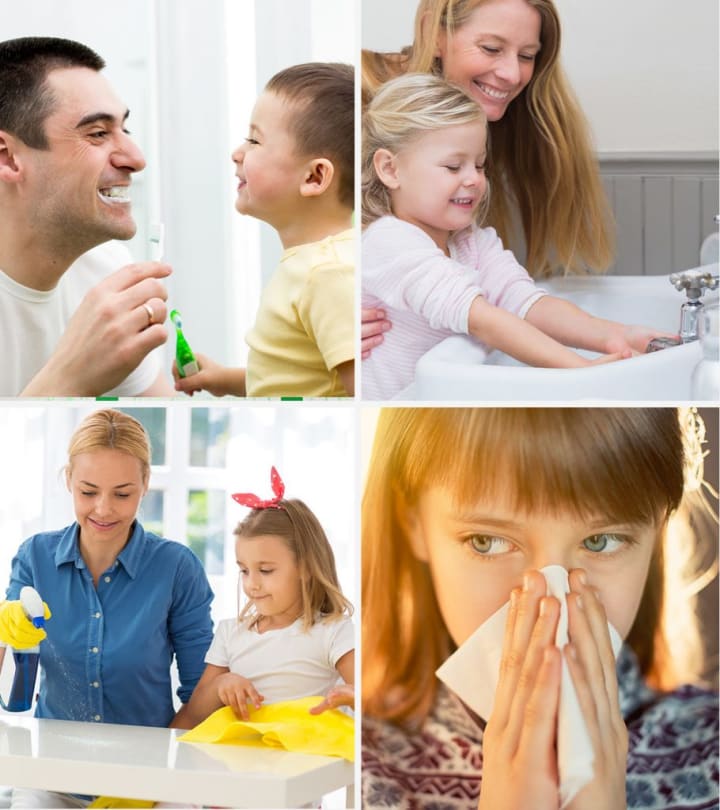
How to Promote Kids' Health: Tips and Strategies
As a parent, one of the most important things you can do is to promote your child's health. With so much conflicting information out there, it can be tough to know where to start. Fortunately, there are some proven tips and strategies that can help you give your child the best possible start in life.
1. Encourage Healthy Eating Habits

Eating a healthy, balanced diet is essential for kids' growth and development. Encourage your child to eat a variety of fruits, vegetables, whole grains, lean proteins, and low-fat dairy products. Limit their intake of processed and sugary foods, as well as unhealthy fats.
2. Make Physical Activity a Priority

Regular physical activity is essential for kids' health. Encourage your child to get at least 60 minutes of exercise every day. This can include activities like playing outside, riding a bike, swimming, or playing sports.
3. Ensure Adequate Sleep

Sleep is crucial for kids' overall health and well-being. Make sure your child gets enough sleep each night. The amount of sleep they need will depend on their age, but most kids need between 9 and 12 hours of sleep each night.
4. Promote Good Hygiene Practices

Teach your child good hygiene practices, such as washing their hands regularly, covering their mouth and nose when they cough or sneeze, and avoiding contact with people who are sick. These practices can help prevent the spread of illness and disease.
5. Stay Up-to-Date on Immunizations

Immunizations are a crucial part of keeping kids healthy. Make sure your child receives all the recommended vaccines on schedule. This can help protect them from serious and potentially life-threatening diseases.
6. Monitor Screen Time

Too much screen time can be harmful to kids' health. Limit your child's use of electronic devices, such as phones, tablets, and computers. Encourage them to engage in other activities, such as reading, playing outside, or spending time with friends and family.
7. Manage Stress

Kids can experience stress, just like adults. Help your child learn healthy ways to manage stress, such as practicing relaxation techniques or engaging in physical activity. Encourage open communication, and let your child know that it's okay to ask for help when they need it.
8. Create a Safe Environment

Make sure your home is a safe and healthy environment for your child. This can include things like ensuring that smoke detectors are working properly, keeping cleaning supplies out of reach, and using child-proof locks on cabinets and drawers.
9. Foster Positive Relationships

Positive relationships can have a significant impact on kids' health and well-being. Encourage your child to develop positive relationships with family members, friends, and peers. Help them learn how to communicate effectively and resolve conflicts in a healthy way.
10. Lead by Example

As a parent, you are your child's most important role model. Lead by example and demonstrate healthy behaviors, such as eating a balanced diet, getting regular exercise, and practicing good hygiene. Your child is more likely to adopt these habits if they see you doing them too.
FAQs
1. How much sleep do kids need?
Most kids need between 9 and 12 hours of sleep each night, depending on their age.
2. How can I encourage my child to eat healthy?
Encourage your child to eat a variety of fruits, vegetables, whole grains, lean proteins, and low-fat dairy products. Limit their intake of processed and sugary foods, as well as unhealthy fats.
3. How can I limit my child's screen time?
Limit your child's use of electronic devices, such as phones, tablets, and computers. Encourage them to read book and play with toys.
4. How can I help my child manage stress?
You can help your child manage stress by teaching them healthy ways to cope, such as relaxation techniques, physical activity, and open communication. Let them know that it's okay to ask for help when they need it.
5. How can I create a safe home environment for my child?
You can create a safe home environment by ensuring that smoke detectors are working properly, keeping cleaning supplies out of reach, and using child-proof locks on cabinets and drawers. Regularly check for any hazards and address them promptly.
6. How important are immunizations for kids' health?
Immunizations are essential for kids' health as they protect against serious and potentially life-threatening diseases. Make sure your child receives all the recommended vaccines on schedule.
7. How can I encourage my child to be physically active?
Encourage your child to be physically active by setting aside time for outdoor play, riding bikes, swimming, or playing sports. Make physical activity a fun and enjoyable experience.
8. Why is it important to foster positive relationships for kids' health?
Positive relationships with family, friends, and peers have a significant impact on kids' health and well-being. Encourage your child to develop these relationships and teach them healthy communication and conflict resolution skills.
9. How can I lead by example to promote my child's health?
Demonstrate healthy behaviors, such as eating a balanced diet, getting regular exercise, and practicing good hygiene. Your child is more likely to adopt these habits if they see you doing them too.
10. What if my child has a chronic health condition?
If your child has a chronic health condition, work closely with their healthcare provider to manage their condition and ensure they receive the care and support they need.
Conclusion
Promoting kids' health is a vital aspect of parenting. By following these tips and strategies, you can help your child develop healthy habits that will serve them well throughout their life. Encourage healthy eating, physical activity, good hygiene practices, and positive relationships. Lead by example, create a safe environment, and help your child manage stress. By working together, you can help your child achieve their best possible health and well-being.





Comments
There are no comments for this story
Be the first to respond and start the conversation.